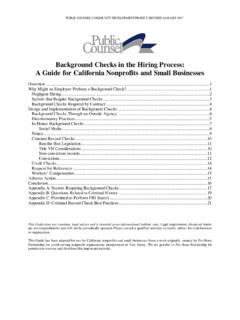Transcription of LEGISLATIVE ALERT: NEW CALIFORNIA LAW AFFECTS …
1 P UBLIC C OUNSEL | C OMMUNITY D EVELOPMENT P ROJECT | L EGISLATIVE A LERT | D ECEMBER 2009. LEGISLATIVE alert : NEW CALIFORNIA LAW AFFECTS . nonprofit GOVERNANCE PRACTICES. Recently enacted CALIFORNIA AB 1233 amends several provisions of the nonprofit Corporation Law. These amendments become effective January 1, 2010 and may require CALIFORNIA nonprofit corporations to review and modify their articles, bylaws or governance practices. While many of these amendments apply to all types of CALIFORNIA nonprofit corporations, the following summary covers only those changes that affect public benefit corporations. If you are a board member or officer of a CALIFORNIA nonprofit public benefit corporation, you should familiarize yourself with these changes so that you can help ensure your organization's compliance with CALIFORNIA law.
2 Should your organization require further assistance to review and possibly amend its corporate policies to comply with or make use of this new law, please call Public Counsel's Community Development Project at (213) 385-2977, extension 200. Our attorneys provide free legal assistance to qualifying nonprofit organizations. This alert should not be construed as legal advice. This alert is designed as a highlight of the new law and will not be updated. This alert does not provide a comprehensive discussion of all provisions of the new law that may be applicable to your organization. Please contact an attorney if you need legal advice about the topics discussed in this alert . * * *. nonprofit corporations may not have non-voting directors Many nonprofit corporations give titles to advisors or major donors that suggest they are directors ( , honorary directors, directors emeritus, advisory directors, etc.)
3 Additionally, many nonprofit corporations have non-voting directors that have the same rights and responsibilities as the other directors, except the power to vote. AB 1233 clarifies that a director is a person who has been elected (or designated or appointed, as provided in the bylaws). to act as a member of the board and vote on actions or decisions taken by the board. Thus, a nonprofit corporation may not have non-voting members on its board of directors. One of the rationales for this change was to clarify the use of ambiguous titles that include the word director. The word director has a specific legal definition with associated rights and 610 S OUTH A RDMORE A VENUE , L OS A NGELES , CA 90005 | T EL : | F AX : | WWW.
4 PUBLICCOUNSEL . ORG. P UBLIC C OUNSEL | C OMMUNITY D EVELOPMENT P ROJECT | L EGISLATIVE A LERT | D ECEMBER 2009. obligations. Knowing which persons are directors and the total number of directors is also relevant in dealing with a number of critical issues ranging from quorum requirements for a board meeting to the limit on interested persons who may serve on the board. A corporation that wishes to involve non-directors in its board meetings may treat these individuals as guests or appoint them to a separate advisory committee. For more information about how non-directors can continue to participate in board meetings, see the section below. Ex officio directors have all the same rights and duties as other directors, including the right to vote Some nonprofit corporations choose to fill one or more of the director positions ex officio.
5 Which means by virtue of a title or position that individual holds. For example, it is not uncommon for a nonprofit 's chief executive to serve as a member of the board by reason of office, rather than through election. Moreover, many organizations limit the voting rights of ex officio directors. AB 1233 clarifies that ex officio directors have all the same rights and duties as other members of the board, including the right to vote. A nonprofit corporation with non-voting (or limited-voting) ex officio directors will need to amend its governing documents to either remove the positions or give the ex officio directors full rights as directors. As a practical matter, however, a corporation may continue to involve non-directors in its board meetings.
6 For example, a corporation may include in its bylaws a provision that the chief executive is required and has the right to attend every board meeting, unless specifically excused by the board. Such a person would be able to express opinions about matters up for discussion, present reports and be involved in the logistics of organizing board meetings, such as notification and setting the agenda. However, a non-director would not be counted toward meeting voting requirements, quorum requirements, etc. Only directors may serve as members of committees that exercise board power nonprofit corporations at times invite individuals who are not directors either to serve as members or participate on committees established by the board.
7 AB 1233 clarifies existing law by expressly prohibiting any committee exercising the authority of the board (a board committee ) from including persons who are not directors as members of the committee. Thus, an executive committee or other board committee that includes any non-voting directors or other non-directors cannot be delegated authority to act on behalf of the board. Corporations, though, may continue to create advisory committees, which do not have authority to act for the board, and both directors and non-directors may serve on these committees. There is also nothing in the law that prohibits a nonprofit corporation from allowing non- members to be present as guests at board committee meetings, or from giving input and participating in board committee work and deliberations, so long as the non-member does not have membership rights ( , voting rights) on the board committee.
8 610 S OUTH A RDMORE A VENUE , L OS A NGELES , CA 90005 | T EL : | F AX : | WWW . PUBLICCOUNSEL . ORG. P UBLIC C OUNSEL | C OMMUNITY D EVELOPMENT P ROJECT | L EGISLATIVE A LERT | D ECEMBER 2009. Directors may not vote by proxy Consistent with the fiduciary duties imposed on directors by current CALIFORNIA law, AB 1233. expressly forbids directors from voting by proxy on matters presented for action at a board or board committee meeting. Thus, although directors as a group may delegate authority, an individual director may not appoint a substitute or alternate to act in his or her place. Each director has one vote Constituents of nonprofit corporations sometimes wish to permit certain directors to possess more than one vote.
9 However, that practice is inconsistent with current law and a director's fiduciary duties. AB 1233 clarifies that each director may have only one vote on matters presented for action at a board or board committee meeting. Bylaws or articles may require specific directors to be present to conduct business at board meetings nonprofit corporations may include in their articles or bylaws a provision that would require the presence of one or more specified directors in order to constitute a quorum and to transact business. This requirement may be in addition to the general quorum requirements contained in the bylaws or articles. This may be useful to nonprofit corporations whose directors represent various constituencies and wish to ensure those constituencies are represented when the board takes action.
10 New default rule allows boards to bypass the right of a third party to approve or reject amendments to articles and bylaws if the specified person ceases to exist or is unresponsive Some nonprofit corporation's articles or bylaws contain a provision that requires the written approval from a person or entity other than the board of directors to amend or repeal the articles or bylaws. These approval rights are problematic, however, if the specified person (or entity). ceases to exist, disappears, or declines to participate in the governance of the corporation and act on proposed amendments. To resolve these issues, the new law states that third party approval requirements will not apply if (i) the specified person(s) have died or ceased to exist, or (ii) the right to approve is in the capacity of an officer or other status and the office or status has ceased to exist.















